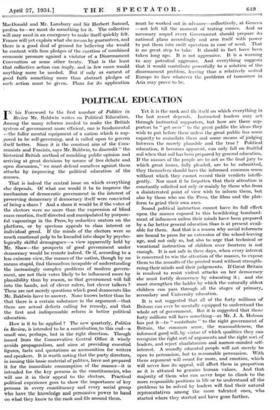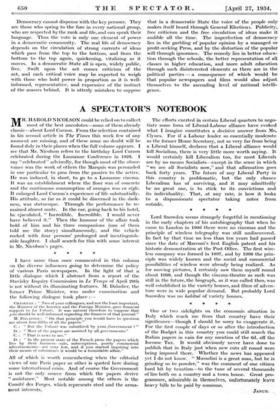POLITICAL EDUCATION
IN his Foreword to the first number of Politics in Review Mr. Baldwin writes on Political Education. Among the many reforms needed to make the British system of government more efficient, one is fundamental —the fuller mental equipment of a nation which is sup- posed to be self-governing, and is called upon to govern itself better. Since it is the constant aim of the Com- munists and Fascists, says Mr. Baldwin, to discredit " the historical British method of moulding public opinion and arriving at great decisions by means of free debate and open discussion," we must defend ourselves against these attacks by improving the political education of the masses.
That is indeed the central issue on which everything else depends. Of what use would it be to improve the mechanism of democratic government in the interest of preserving democracy if democracy itself were convicted of being a sham ? And a sham it would be if the votes of the electors were no more than the expression of blind mass emotion, itself directed and manipulated by purpose- ful vapourings in the Press, by seductive orators on the platform, or by specious appeals to class interest or individual greed. If the minds of the electors were so much emotional pulp to be kneaded into shape by psycho- logically skilful demagogues—a view apparently held by Mr. Shaw—the prospects of good government under democracy would be remote indeed. Or if, according to a less extreme view, the masses of the nation, though by no means stupid, find themselves incapable of understanding the increasingly complex problems of modern govern- ment, are not their votes likely to be influenced more by plausibility than by reason, so that government will fall into the hands, not of clever rulers, but clever talkers ? These are not merely questions which good democrats like Mr. Baldwin have to answer. None knows better than he that there is a certain substance in the argument—that there are actual defects calling for remedy, and that the first and indispensable reform is better political education.
How is it to be applied ? The new quarterly, Polities in &view, is intended to be a contribution,to this end—a small one, perhaps, but in the right direction. Though issued from the Conservative Central Office it wisely avoids. propagandism, and aims at providing essential figures, facts and quotations as ammunition for writers and speakers. It is worth noting that the party directors, in issuing this basic material of polities, have not prepared it for the immediate consumption of the masses—it is intended for the key persons in the constituencies, who will use it in their appeal to the electors. Practical political experience goes to show the importance of key persons in every constituency and every social group who have the knowledge and persuasive power to hand on what they know to the rank and file around them. Yet it is the rank and file itself on which everything in the last resort depends. Instructed leaders may act through instructed supporters, but how are these sup- porters to " get over " to the great public the ideas they wish to put before them unless the great public has some capacity to assimilate them and some means of judging between the merely plausible and the true ? Political education, it becomes apparent, can only fall on fruitful soil when that soil has been prepared by general education. If the masses of the people arc to act as the final jury to which great issues, fully pleaded, are to be submitted, they themselves should have the informed common sense without which they cannot record their verdicts intelli- gently. Nor must it be forgotten that their attention is constantly solicited not only or mainly by those who from a disinterested point of view wish to inform them, but also by those who use the Press, the films and the plat- form to grind their own axes.
Sound political instruction cannot have its full effect upon the masses exposed to this bewildering bombard- ment of influences unless their minds have been prepared by a far better general education than is at present avail- able for them. And that is a reason why social reformers are bound to press for an extension of the school-leaving age, and not only so, but also to urge that technical or vocational instruction of children over fourteen is not enough. It is not safe in these days, when every interest is concerned to win the attention of the masses, to expose them to the assaults of the printed word without strength- ening their minds and their judgements. If Great Britain is resolved to resist violent attacks on her democracy she must fortify democracy by educating it ; and she must strengthen the ladder by which the naturally ablest children can pass through all the stages of primary, secondary and University education.
It is not suggested that all of the forty millions of Britons can ever be mentally equipped to understand the whole art of government. But it is suggested that those forty millions will have something—as Mr. J. A. Hobson has put it—to " contribute " to the right government of Britain, the common sense, the reasonableness, the informed good will, by virtue of which qualities they can recognize the right sort of arguments and the right sort of leaders, and reject charlatanism and narrow-minded self- interest. A soundly educated people will not merely be open to persuasion, but to reasonable persuasion. With them argument will count for more, and emotion, which will never lose its appeal, will affect them in proportion as it is attuned to genuine human values. And that majority of them who can never hope to climb to the more responsible positions in life or to understand all the problems to be solved by leaders will find their natural representatives among the more talented ones, who started where they started and have gone further. Democracy cannot dispense with the key persons. They are those who spring to the fore in every national group, who are respected by the rank and file, and can speak their language. Thus the vote is only one element of power in a democratic community. The real life of democracy depends on the circulation of strong currents of ideas which pass from the top to the bottom, and from the bottom to the top again, quickening, vitalizing as it moves. In a democratic State all is open, widely public, free. Swift upon the act comes criticism of the act, and each critical voice may be expected to weigh with those who hold power in proportion as it is well- informed, representative, and expressive of the instinct of the masses behind. It is utterly mistaken to suppose that in a democratic State the voice of the people only makes itself heard. through General Elections. Publicity, free criticism and the free circulation of ideas make it audible all the time. The imperfection of democracy lies in the garbling of popular opinion by a managed or profit-seeking Press, and by the distortion of the popular will through ignorance. The remedy lies in better educa- tion through the schools, the better representation of all classes in higher education, and more adult education through such disinterested elements as there are in the political parties — a consequence of which would be that popular newspapers and films would also adjust themselves to the ascending level of national intelli- gence.













































 Previous page
Previous page